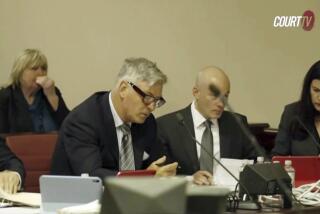A Little Bit of a Hanging
SANTA MONICA — It was a hanging crowd that convened here Friday at the little courthouse by the beach. It had the feel and features of the throngs that can be found outside San Quentin on certain midnights. That this was not to be a true execution hardly seemed to matter. O.J. Simpson was to be sat down in a chair and forced to face his accusers, to answer for himself in the killings of his ex-wife Nicole and Ron Goldman.
Like all modern executions, this was to be a mostly private affair. The chanters and commentators and camera-toters arranged under palms and magnolias outside the courthouse had to make do with occasional bits of third-hand information from within. They kept looking up wistfully toward the second-floor courtroom, as if expecting a power surge or puff of black smoke--something to signal that the procedure was underway.
A lottery had been held to select a handful of public witnesses. A few alternates also were chosen, and as the courtroom began to fill, these near-missers became desperate to improve their status. “Guard, guard,” hissed a woman in leopard-print slacks. She pointed to a lottery winner passing through security. “Check her pass number. Check her pass number. She bought her pass off someone.” This ploy failed, and the would-be Madame Defarges next took aim at a well-dressed, elderly woman they deemed suspicious.
“Did you see that? She just waltzed in.”
“Who is she?”
“Get the bailiff. Oh, we’re going to get her seat.”
*
Inside, Simpson sat alone in a swivel chair, his every tic and grimace watched closely by all. Nervous, Simpson would lick his lips, and 40 pens would flash across 40 notebooks: “11:15 a.m. Licks lips.” For the most part, Simpson kept his eyes trained on one man, the lawyer Petrocelli, who kept dropping pellets in the form of questions.
Did he hit her?
Did he slap her?
Did he love her?
Did he kill her?
Simpson did not go quietly. If this was a real execution, he would go down the sort who proclaimed innocence to the end, and then bucked and strained at the restraints as the gas took hold. He denied it all, every blow, every bruise, every incident and emotional quirk that might be depicted as a step down a path toward murder. In short, he did not dance on the rope for the spectators. His was a different dance.
Watching him perform, it became obvious that much of Simpson’s background had prepared him for this engagement. For example, all morning the father of Ron Goldman stared fiercely at Simpson, as if trying to intimidate him. Simpson, having no doubt encountered the same tactic across the line from a thousand middle linebackers, never gave Goldman as much as a glance. Similarly, during questioning, Simpson would perch, television commentator-style, on the edge of his chair, alert, erect, poised: on. At every break, he would slump back, exhale, tweak his neck and go visibly blank, as if gathering himself off-camera during a run of lite beer and pickup commercials.
*
Those who promote capital punishment preach about the closure it supposedly provides the families of victims. The Simpson testimony was seen as a similar outlet for the Browns and Goldmans. At least now, it was said, they would have him under oath. At least now they could watch him squirm. This faith in the power of sworn testimony, incidentally, seems a bit off-tilt: If, as those people so fervently believe, Simpson is capable of double homicide, why should he be bothered one whit by perjury?
Anyway, the civil suit has begun to serve its main purpose. Simpson has been put on the stand, hit with the hard questions. He’ll get more of the same over the next few days. Once his testimony ends, there is little more that the trial can deliver, and the wise counsel would be to commence settlement talks.
The verdict will not change anything, especially anyone’s mind. People will believe what the jury finds, if the jury finds what people already believe. Some money might change hands, but typically in these cases most of it flows between lawyers and insurers in a process that consumes years. Those who envision Simpson wandering the streets, in defeat, as some sort of ragamuffin must remember this is a society that made millionaires of the prosecutors who failed to convict him.
As for the Browns and Goldmans, no courtroom, no verdict, can return their daughter and son, and they must resign themselves to what must seem to them a pitiful approximation of justice. Their moment is now, with Simpson on the stand. It’s as close to a public atonement, this nonlethal hanging, as they are going to get.
More to Read
Sign up for Essential California
The most important California stories and recommendations in your inbox every morning.
You may occasionally receive promotional content from the Los Angeles Times.











